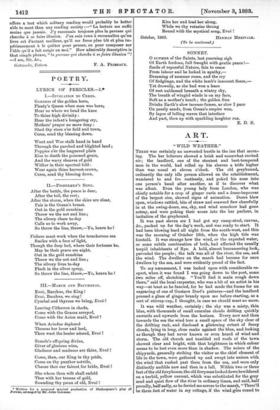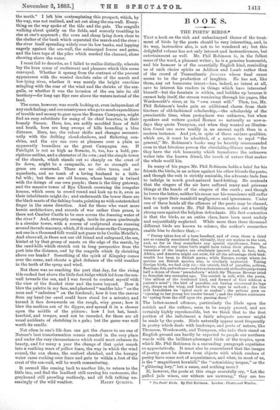ART.
"WILD WEATHER."
THERE was certainly an unwonted bustle in the inn that morn- ing. The bar loiterers showed a brisk and somewhat excited. air; the landlord, one of the stoutest and best-tempered men in the world, had rolled up his sleeves a trifle higher than was usual at eleven o'clock. The old greyhound,. ordinarily the only idle person allowed on the establishment,. wandered to and fro restlessly, and poked his nose into. one person's hand after another, as if to discover what was afloat. Even the young lady from London, who was. chiefly notable for a crop of ginger curls and a dress-improver. of the largest size, showed signs of animation. Doors blew open, windows rattled, bits of straw and seaweed flew cheerfully in at the swing•doors, sea, sky, and wind somehow had gone astray, and were poking their noses into the bar parlour, in. imitation of the greyhound.
It was past eleven ere I had got my camp-stool, canvas, &c., packed up for the day's work, and was ready to start. It had been blowing hard all night from the south-west, and this was the morning of October 18th, when the high tide waa foretold. It was strange how the wind, or the expected water, or some subtle combination of both, had affected the usually torpid inhabitants of Rye. A bold, almost buccaneering look,. pervaded the people ; the talk was all of the river, the sea, and the wind. The dwellers on the marsh had become for once dwellers by the sea, and were evidently proud of the fact.
To my amusement, I was looked upon with considerable re- spect, when it was found I was going down to the port, some .two miles off, sketching. "You'll find it main rough down there," said the local carpenter, who was a bit of an artist in his way—at least so he fancied, for he had made the frame for an engraving of one of Gustave Dore's pictures—and the landlord pressed a glass of ginger brandy upon me before starting, as a sort of stirrup cup, I thought, in case we should meet no more.
It was wild weather, certainly ; the sky was a misty, thin. blue, with thousands of small cumulus clouds drifting quickly onwards and upwards from the horizon. Every now and then towards the sea the wind tore a small space of the sky clear of the drifting rack, and disclosed a glistening extent of fleecy clouds, lying in long, close ranks against the blue, and looking as though they had never known or even heard of wind and storm. The old church and tumbled red roofs of the town showed clear and bright, with that brightness in which colour seems to be lost even more than in shadow. The noises of the shipyards, generally striking the visitor as the chief element of life in the town, were gathered up and swept into unison with the wind that rushed past them from the sea, and wore only distinctly audible now and then in a lull. Within two or three feet of the old ferryhouse, the old ferryman looked down bewildered on a turbid, yellow current, which was substituted for the grey mud and quiet flow of the river in ordinary times, and said, half proudly, half sadly, as he ferried me across to the marsh, " There'll be three feet of water in my cottage, if the wind gOes round. to
the north." I left him contemplating this prospect, which, by the way, was not realised, and set out along the sea-wall. Every- thing on the way spoke of the tide and the gale. The seagulls walking about quietly on the fields, and scarcely troubling to rise at one's approach ; the cows and sheep lying down close to the shelter of the bank which separated the marsh and the river ; the river itself spreading widely over its low banks, and lapping eagerly against the sea-wall, the submerged fences and gates, and the bare tops of the piles which marked the channel, alone showing above the water.
I mast fail to describe, as I failed to realise distinctly, wherein lay the keen sense of excitement and pleasure which this scene conveyed. Whether it sprang from the contrast of the present appearance with the wonted desolate calm of the marsh and low-lying river, whether it was merely the bright sunshine mingling with the roar of the wind and the shrieks of the sea- gulls, or whether it was the invasion of the sea into its old territory—for long ago Rye rose above the waters instead of the land.
The scene, however, was worth looking at, even independent of any such feeling; and our countrymen who go to mach expenditure of trouble and money to gaze upon the Roman Campagna, might find an easy substitute for many of its chief beauties, in their homely Sussex. Here, too, are softly moulded lines of field and heath, here are long sweeps of hills bounding a blue distance. Here, too, the colour shifts and changes moment- arily with the drifting cloud-shadows, and flickering sun- shine, and the eye can rove at pleasure over a plain as apparently boundless as the great Campagna sea. If Fairlight is not as high as Soracte, it, too, has a bold, pre- cipitous outline, and a character of its own ; and the simple tower of the church, which stands out so sharply on the crest of its down, might be a campanile, as far as strength and grace are concerned. There are no olive trees, and no aqueducts, and no tomb of a loving husband to a faith- ful wife ; but there are old houses, whose beauty is twined with the doings of our own people ; there is the Grey gateway, and the massive tower of Rye Church crowning the irregular houses, which seem to crowd round and look up to it, even as their inhabitants might do; and underneath the tower there are the black masts of the fishing-boats, pointing as with outstretched finger in the same direction. And for those who want more heroic architecture, and records of war rather than peace, is there not. Camber Castle to be seen across the foaming water of the river P And, strangely enough, inside its green quadrangle is a circular tower, with a course of sculptured stone running around its rude masonry, which, if it stood alone on the Campagna, not one in a thousand folk would not guess to be Cecilia Metella's. And above all, is there not our old friend and safeguard, the sea, hinted at by that group of masts on the edge of the marsh, by the sand-hills which stretch out in long perspective from the port into the distance, and by the seagulls which fly shrieking above our heads F Something of the spirit of Kingsley comes over the scene, and shouts a glad defiance of the wild weather in the teeth of the spray and wind.
Bat there was no reaching the port that day, for the rising tide rushed feet above the little foot-bidge which led from the sea- wall towards the sea, and I was forced to content myself with the view of the flooded river and the town beyond. How it blew the palette in my face, and plastered " madder lake " on the nose and " cadmium " on the forehead ; bow it tore the canvas from my hand (no easel could have stood for a minute), and turned it face downwards on the rough, wiry grass; how it blew the medium out of its dipper, and spread it in a shower upon the middle of the picture ; how I lost hat, hand- kerchief, and temper, need not be recorded, for these are all usual accidents of sketching in a gale ; but the game was well worth its candle.
Not often in one's life does one get the chance to see one of Nature's best transformation scenes enacted in the very place and under the very circumstances which could most enhance its beauty, and for many a year the change of that quiet marsh into a seething mass of yellow foam, the way in which the wind roared, the sun shone, the seafowl shrieked, and the hungry water came rushing over fence and gate to within a foot of the crest of the sea-wall, will be worth remembering.
It seemed like coming back to another life, to return to the little inn, and find the landlord still serving his customers, the greyhound still prowling restlessly, and all folk talking un-
ceasingly of the wild weather. HARRY QUILTER.







































 Previous page
Previous page